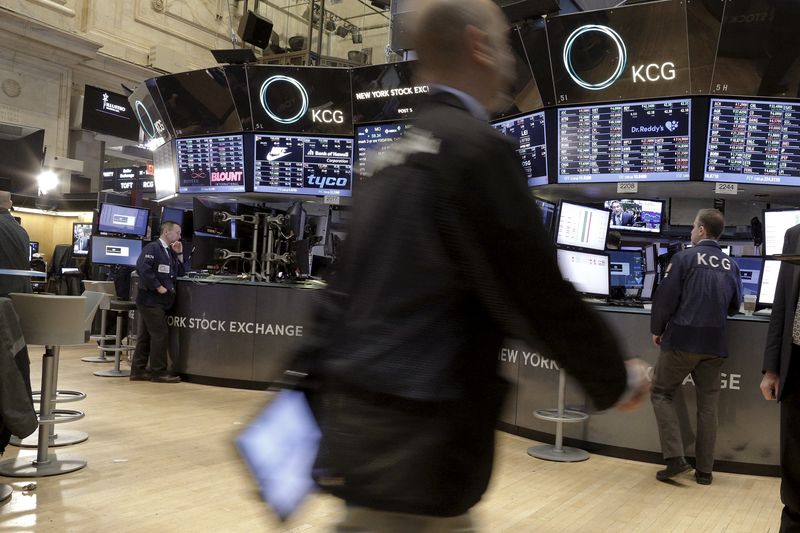By Geoffrey Smith
Investing.com -- Russia formalizes the biggest land grab the world has seen in decades. The U.S. releases personal income and spending data for August. Stocks are under pressure amid signs of weakness at Facebook owner Meta Platforms and even Amazon. The Eurozone's inflation rate hits 10%, and European energy ministers still can't bridge their differences over how to moderate the looming energy crisis. Here's what you need to know in financial markets on Friday, September 30, the last day of the third quarter.
1. Russian land grab
Russian President Vladimir Putin signed a decree formally annexing four regions of Ukraine, the biggest land grab the world has seen in at least three decades and the biggest step to restoring Russian control over its satellite states since the collapse of the Soviet Union.
The move follows referendums held last weekend at gunpoint in the regions of Zaporizhzhya and Kherson, and under intense duress in Donetsk and Luhansk, which were condemned by UN Secretary-General Antonio Guterres. Ukraine, the U.S., U.K., and EU have all said they will never recognize the actions.
Putin signed the decree on a day when Russia’s forces appeared on the verge of another defeat in eastern Ukraine, being forced to evacuate the town of Lyman in the Donetsk region, further complicating the task of supplying Moscow's troops further south.
2. Meta hiring freeze, Amazon to close call centers
Meta Platforms (NASDAQ:META), the owner of Facebook and Instagram, will freeze hiring and look to cut costs, in a rare retrenchment for a company that has known nothing but growth in its 18-year history. Meta stock, which hit its lowest in nearly four years earlier this week, rose 1.1% in premarket trading on relief that it’s addressing an increasingly pressing cost problem.
Elsewhere, Bloomberg reported that Amazon (NASDAQ:AMZN) will close all but one of its five call centers in the U.S., as it too struggles to keep a lid on costs – this time with regard to its outlays on real estate. Amazon will seek to adopt a remote working regime instead, Bloomberg reported.
Along with reports of Apple’s (NASDAQ:AAPL) supposed intention to cancel an increase in iPhone production, the impression is that the slowdown is reaching even those mega-cap stocks which supported the U.S. market for most of the last decade.
3. Stocks set for sixth weekly drop in seven; personal income & spending data eyed
U.S. stocks are set to recoup some of Thursday’s slowdown-driven losses at the open but are still on course for what would be their sixth weekly loss in the last seven.
By 06:20 ET (10:20 GMT), Dow Jones futures were up 201 points, or 0.7%, while S&P 500 futures and Nasdaq 100 futures were up by slightly more.
The early focus will be on personal income and spending data for August, which are due at 08:30 GMT, along with the August reading for personal consumption expenditures prices which – it may have been forgotten – are the Federal Reserve’s preferred measure of inflation.
A flurry of Fed speeches follows, with interventions from vice chair Lael Brainard, New York Fed President John Williams, Richmond’s Tom Barkin, and Cleveland’s Loretta Mester.
4. Eurozone inflation hits 10%
There’s no relief in sight for the European Central Bank. The Eurozone’s inflation rate rose to 10% in September, thanks to sharp rises in Germany and the Netherlands that offset weaker trends in France and Spain.
There was slightly better news from the labor market, as unemployment figures in Germany and Italy both turned out better than expected, although that picture is also likely to deteriorate as an exceptional summer tourism season comes to an end. In Germany, the number of people in work had already topped out in August.
Elsewhere in Europe, the pound returned to its pre-budget level of $1.12 as Prime Minister Liz Truss and Chancellor of the Exchequer Kwasi Kwarteng finally met with the Office of Budget Responsibility. Kwarteng’s refusal to allow the OBR to publish an independent assessment of his mini-budget’s impact had been one of the main factors behind the slump in sterling that followed it.
5. Oil bounces ahead of reported OPEC+ plans to cut quotas
Crude oil prices consolidated back above $80 as the dollar weakened, with the market supported by reports that OPEC and its allies will cut production quotas again when they meet next week.
What effect that will have on actual production volumes is unclear, given that the bloc is already failing to meet its quotas by a margin of over 3 million barrels a day.
Elsewhere, EU Energy Ministers met again to thrash out ways to mitigate the looming energy crisis, a day after Germany said it will borrow up to 200 billion euros ($198 billion) to cushion the impact of energy prices on its economy this winter.
By 06:30, U.S. crude futures were up 0.4% at $81.54 a barrel, while Brent was up 0.4% at $87.50 a barrel.
